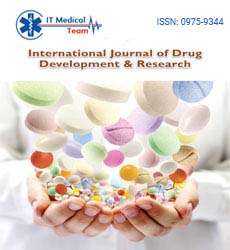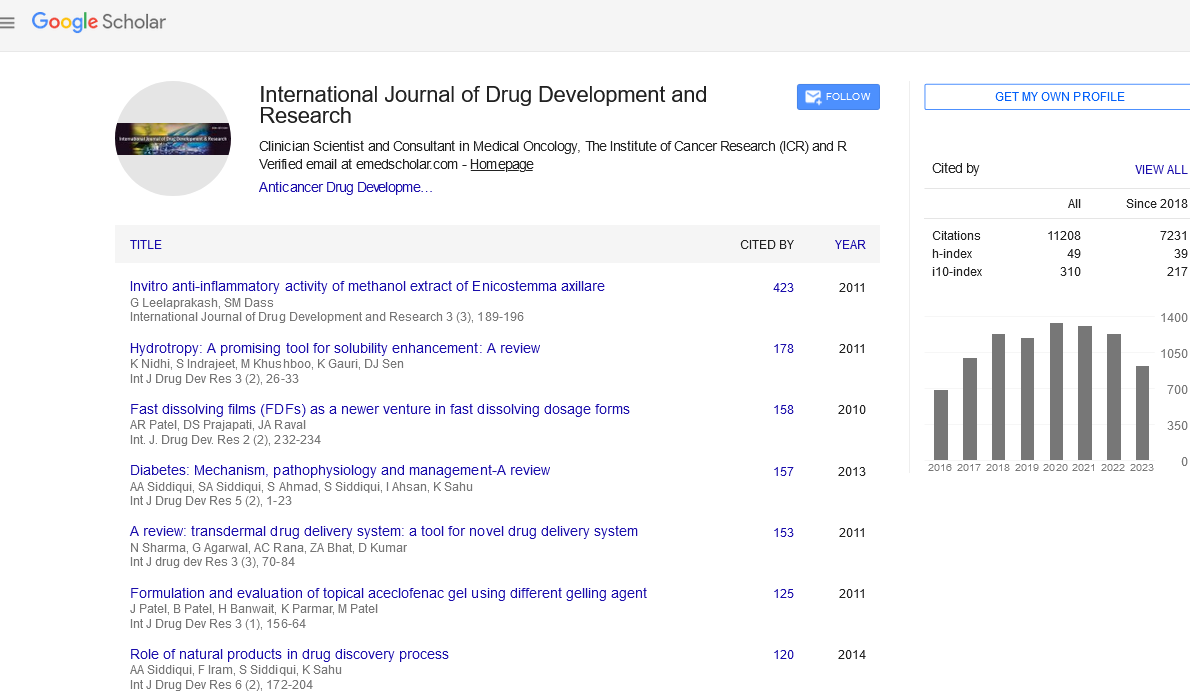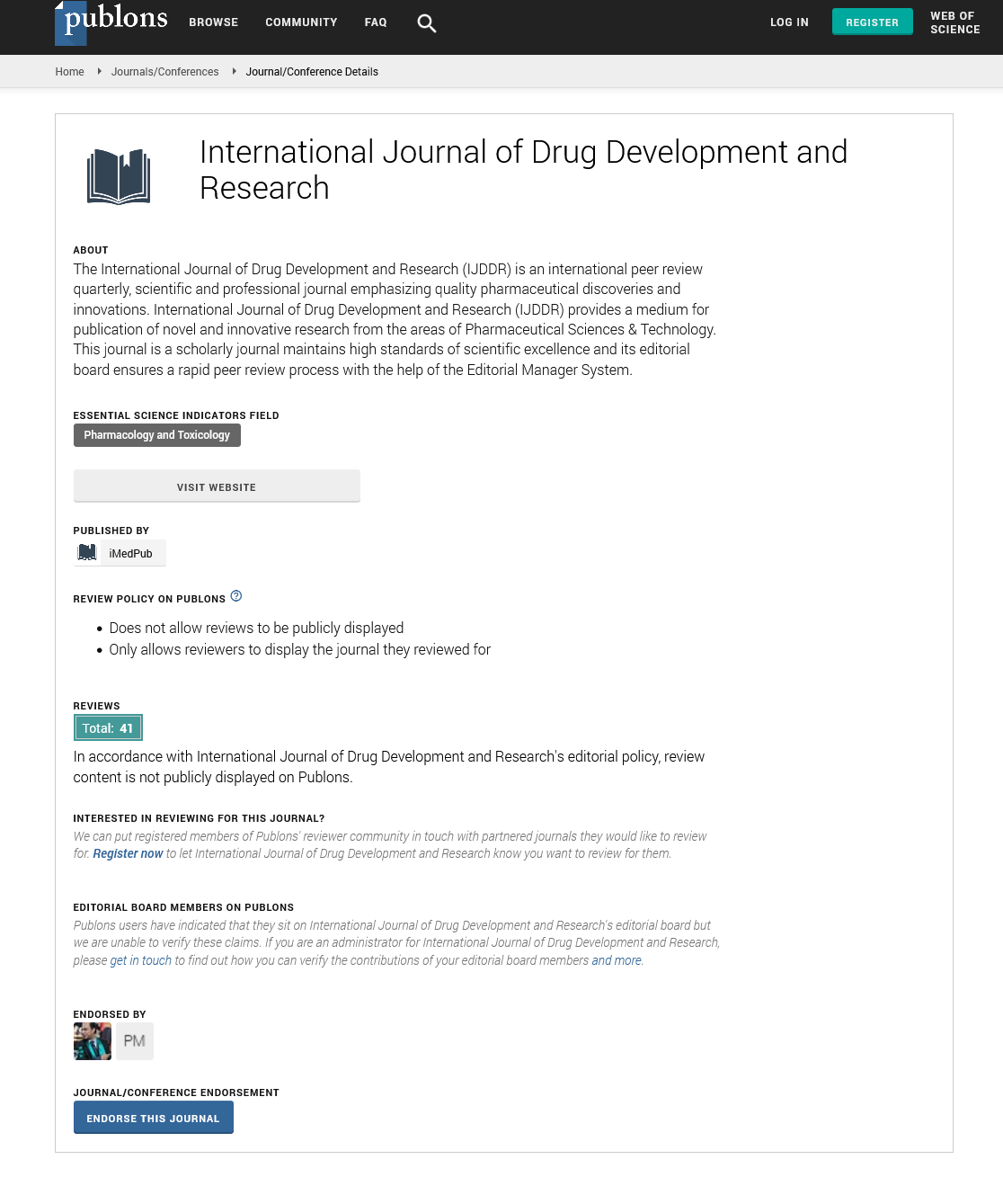Perspective - (2023) Volume 15, Issue 5
Exploring the frontier of anti-cancer agents: A promising arsenal in the war against cancer
Yurong Lai*
Department of Pharmaceutical Sciences, Chosun University, Gwangju, South Korea
*Correspondence:
Yurong Lai, Department of Pharmaceutical Sciences, Chosun University, Gwangju,
South Korea,
Email:
Received: 13-Sep-2023, Manuscript No. ijddr-23-14181;
Editor assigned: 15-Sep-2023, Pre QC No. P-14181;
Reviewed: 29-Sep-2023, QC No. Q-14181;
Revised: 06-Oct-2023, Manuscript No. R-14181;
Published:
20-Oct-2023
Introduction
Cancer remains one of the most formidable adversaries of
human health. It's a multifaceted, relentless disease that has
claimed countless lives. Despite the substantial progress
made in the field of oncology, the quest for effective anti-cancer
agents continues to be a top priority for researchers,
clinicians, and patients alike. In this article, we delve into
the world of anti-cancer agents, their diverse mechanisms
of action, and the cutting-edge developments that hold the
promise of enhancing cancer treatment and, ultimately,
saving lives.
Understanding cancer: A complex battle
Cancer is an umbrella term for a group of diseases
characterized by the uncontrolled growth and spread
of abnormal cells. These cells can form tumors, invade
surrounding tissues, and, if left untreated, metastasize to
other parts of the body. The complex nature of cancer
necessitates equally intricate approaches to combat
it effectively. While surgery, radiation therapy, and
chemotherapy have been cornerstones of cancer treatment,
these modalities often come with side effects and may not
always lead to complete remission. Anti-cancer agents play
a pivotal role in expanding our arsenal against this disease.
Description
Chemotherapy: The conventional approach
Chemotherapy has been a primary modality in cancer
treatment for decades. It involves the use of drugs to target
and destroy rapidly dividing cancer cells. Unfortunately,
chemotherapy also affects healthy cells in the process,
leading to debilitating side effects such as hair loss, nausea,
and immune system suppression.
The development of more selective anti-cancer agents has
been a primary focus to minimize these side effects. Here,
we explore some of the most promising ones:
Immunotherapy: Unleashing the body's
defenses
Immunotherapy is a revolutionary approach to cancer
treatment that harnesses the body's immune system
to recognize and attack cancer cells. This cutting-edge
technique includes monoclonal antibodies, immune
checkpoint inhibitors, and adoptive cell transfer.
Checkpoint inhibitors, for instance, target proteins that
inhibit immune responses, allowing the immune system to better recognize and attack cancer cells.
One remarkable success story is the use of PD-1 and PD-L1
inhibitors in treating melanoma and certain types of
lung, bladder, and kidney cancers. These inhibitors have
provided durable responses in some patients and have
become a beacon of hope in the battle against cancer.
Targeted therapy: Precision medicine
Targeted therapy is another ground breaking approach that
seeks to precisely target the molecular alterations specific
to cancer cells while sparing healthy ones. This approach
minimizes collateral damage and side effects, making it a
significant advancement in anti-cancer treatment.
One of the first success stories in targeted therapy is the use
of Imatinib (Gleevec) to treat Chronic Myeloid Leukemia
(CML). Imatinib specifically targets the BCR-ABL fusion
protein found in CML cells, leading to a remarkable
increase in survival rates.
Gene therapy: Rewriting the code of cancer
Gene therapy is an exciting field that involves the
modification of a patient's genes to treat or prevent disease.
In the context of cancer, it can be used to repair or replace
faulty genes, stimulate the immune system to attack cancer
cells, or introduce therapeutic genes into the body.
The recent development of CAR-T cell therapy is a
testament to the potential of gene therapy in cancer
treatment. CAR-T cells are engineered to express Chimeric
Antigen Receptors (CARs) that specifically t arget c ancer
cells. This approach has shown extraordinary results in
treating certain blood cancers like acute lymphoblastic
leukemia and diffuse large B-cell lymphoma.
Anti-angiogenesis therapy: Starving tumors
Cancer cells require a constant supply of blood vessels to
fuel their growth. Anti-angiogenesis therapy aims to inhibit
the formation of new blood vessels, thereby starving the
tumor. Bevacizumab (Avastin) is a notable anti-angiogenic
drug used in the treatment of various cancers, including
colorectal, lung, and kidney cancer.
Combination therapy: A multi-pronged
approach
Cancer is a complex disease with diverse mechanisms of
growth and resistance. To combat it effectively, researchers
are increasingly exploring combination therapy, where two
or more anti-cancer agents are used simultaneously. This
approach addresses multiple pathways involved in cancer
development and minimizes the risk of resistance.
For example, a common approach in breast cancer
treatment combines chemotherapy with targeted therapies
such as trastuzumab (Herceptin) for HER2-positive
tumors. This combination approach has shown remarkable
success in improving patient outcomes.
Overcoming resistance: A constant
challenge
One of the greatest challenges in cancer treatment is the
development of resistance to anti-cancer agents. Cancer
cells can adapt and evolve, rendering once-effective
therapies ineffective. To address this, ongoing research is
focused on understanding the mechanisms of resistance
and developing strategies to overcome it.
Some promising avenues include the development
of novel drug delivery systems, the identification of new
drug targets, and the use of artificial intelligence and
machine learning to predict resistance patterns and adapt
treatment strategies accordingly.
Future directions: The path ahead
The battle against cancer is far from over, but the
landscape of anti-cancer agents is continually evolving.
The future holds great promise as researchers explore new
frontiers:
Liquid biopsies: These non-invasive tests can detect
cancer through the analysis of circulating tumor DNA,
proteins, and other biomarkers. Liquid biopsies offer early
detection, monitoring of treatment response, and insights
into tumor evolution.
Nanotechnology: The use of nanoparticles for drug
delivery allows for precise targeting of cancer cells and
minimizes damage to healthy tissues. Nanotechnology is
an exciting avenue for enhancing the effectiveness of
anti-cancer agents.
Personalized medicine: Advancements in genomics and
proteomics enable the tailoring of cancer treatment to an
individual's unique genetic makeup. This personalized
approach promises more effective and less toxic treatments.
Epigenetic therapy: Epigenetic modifications play
a critical role in cancer development. Drugs that target
these modifications are being explored as potential anticancer
agents.
Immunotherapies beyond checkpoint inhibitors: Ongoing research aims to expand the scope of
immunotherapies by targeting new immune pathways and
discovering novel biomarkers.
Conclusion
The pursuit of effective anti-cancer agents is a re lentless
endeavor, with researchers and healthcare professionals
striving to provide the best possible care to cancer
patients. The ever-evolving landscape of anti-cancer
agents, from immunotherapies to gene therapies and
targeted treatments, has redefined the way we approach
this disease. While challenges remain, from drug resistance
to treatment-related side effects, ongoing research and
innovation hold the promise of significantly improving
the prognosis for cancer patients.
As we move forward, the integration of cutting-edge
technologies, personalized medicine, and combination
therapies will continue to expand our arsenal against
cancer. The ultimate goal is not just to treat cancer but to
conquer it, offering hope to those affected by this
devastating disease.






